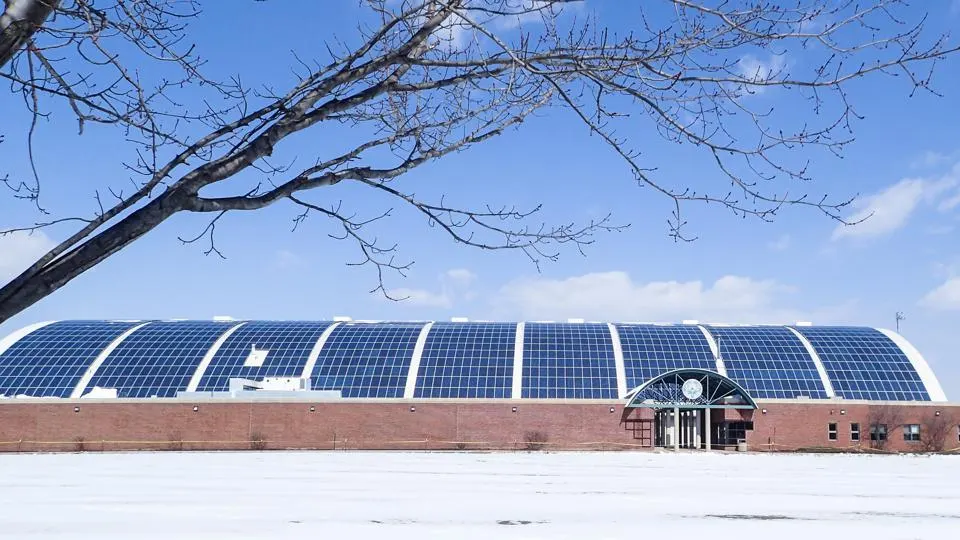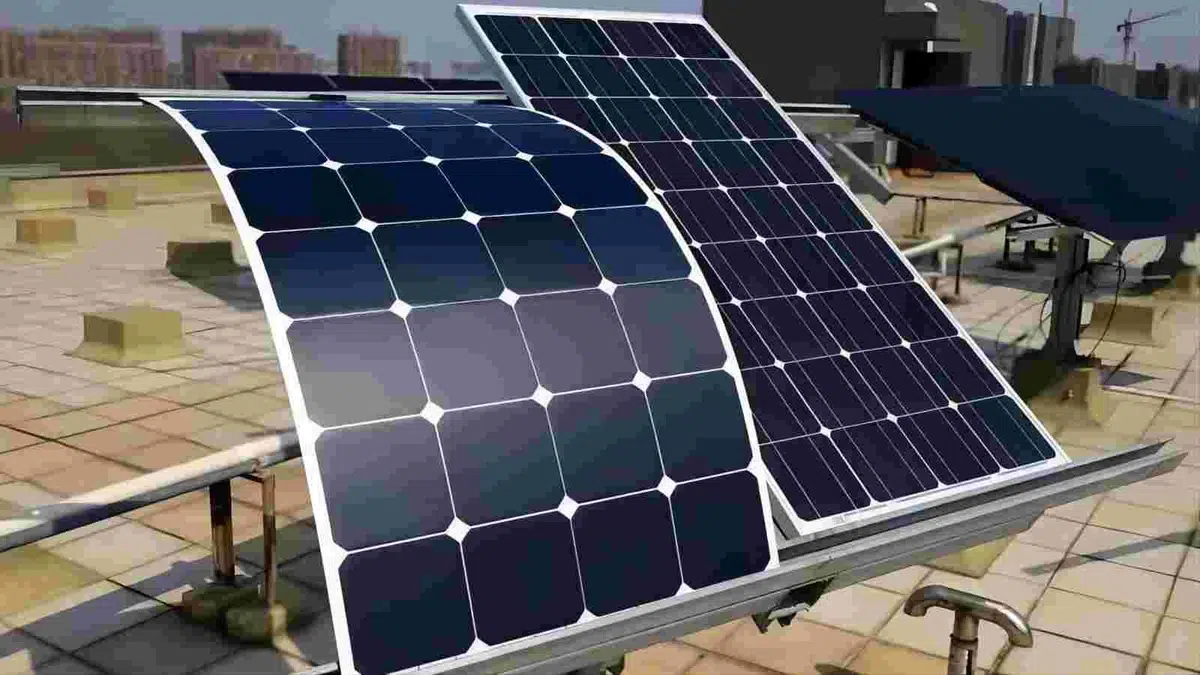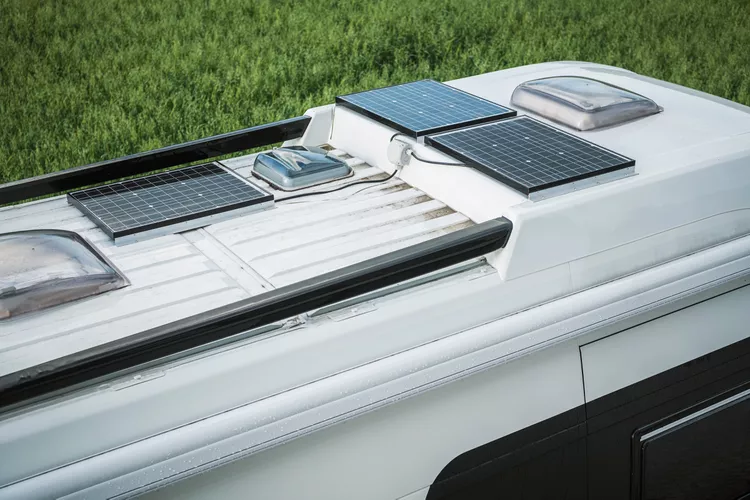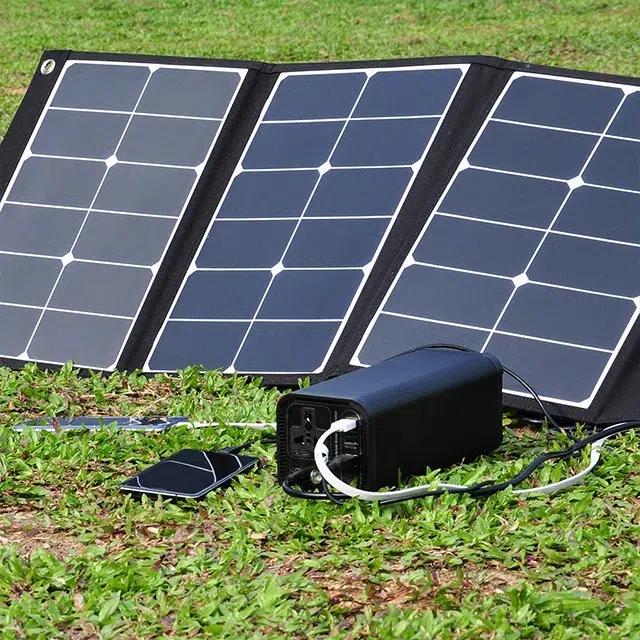
Agora é o momento perfeito para explorar o uso da energia solar, e o desenvolvimento de células solares abriu novas maneiras de usar a tecnologia solar. Como fonte de energia limpa e renovável, a energia solar é uma solução fundamental para combater as alterações climáticas.
Painéis solares flexíveis, é pouco conhecido no campo das novas ciências e tecnologias energéticas, mas também traz um grande potencial. A sua versatilidade permite-nos aplicar a energia verde a uma série de novas indústrias. Neste artigo, iremos levá-lo a uma compreensão abrangente das informações relevantes sobre painéis solares flexíveis, para que você tenha uma compreensão profunda dele!
Qual é a diferença entre painéis solares flexíveis e painéis solares padrão?

Tanto o painel solar flexível quanto os painéis solares padrão são dispositivos que convertem a luz do sol em eletricidade. No entanto, os cenários de construção e aplicação entre eles são muito diferentes.
Painel solar padrão, como aqueles que você vê em muitos telhados, são feitos de materiais duros, como vidro, o que os torna pesados e grossos. Este design os torna duráveis, o que é bom para uso externo a longo prazo. No entanto, é justamente por causa desse design robusto que os painéis solares padrão exigem muitos equipamentos e profissionais especializados quando são instalados, e só podem ser instalados em superfícies planas específicas, como telhados.
Em contraste, painel solar flexível parece ser mais leve e flexível. Eles não requerem suportes pesados ou muito trabalho de instalação, e pode simplesmente ser enrolado ou dobrado, então eles são adequados para uma variedade de superfícies, como tendas, veículos, e até roupas.
Embora o painel solar flexível possa não ser tão forte quanto o painel solar padrão, mas sua grande conveniência e flexibilidade de instalação, de modo que se tornou a escolha em muitas ocasiões.
Tipos de painel solar flexível
Os painéis solares flexíveis são divididos principalmente em três tipos: painéis solares de silício, painéis solares de película fina e painéis ajustáveis feitos de materiais orgânicos
Painel solar monocristalino flexível
Como o nome sugere, esses painéis solares são feitos de silício. Neste painel, muitos cristais são usados.
Os usuários podem dobrar esses painéis solares flexíveis 30 graus. Embora o modelo tradicional também utilize painéis solares de silício, tem um corpo duro e inflexível.
Painéis solares flexíveis de película fina
Nestes painéis, materiais fotovoltaicos são colados ou impressos em folhas de alumínio, pano ou papel grosso.
Estes painéis solares são muito flexíveis porque o tecido pode ser enrolado e mantido em espaços apertados. No entanto, eles são menos eficientes e menos duráveis do que os modelos anteriores de painéis solares cristalinos.
Painéis solares flexíveis feitos de materiais orgânicos
Este é o terceiro tipo de painel solar flexível, que é feito principalmente de materiais orgânicos. A indústria de painéis solares enfrenta dificuldades devido à fragilidade dos eletrodos.
No entanto, os fabricantes usam eletrodos de grafeno ao fabricar esses painéis solares. Os consumidores têm grandes expectativas em relação à atualização e acreditam que os novos painéis solares proporcionarão melhor funcionalidade e durabilidade.
Como funcionam os painéis solares flexíveis
O núcleo de um painel solar flexível é um material semicondutor, geralmente consistindo de silício, berílio, ou algum outro elemento específico. Quando o sol brilha no material semicondutor, a energia nele fará com que os elétrons deixem os átomos, resultando no fluxo de corrente, e então o fluxo de corrente é armazenado, para alcançar o processo de energia solar em eletricidade.
Na verdade, todas as formas de painéis solares, seja flexível ou padrão, são fabricados em azul escuro ou preto. A razão para isso é que as cores mais escuras absorvem mais luz solar.. Durante o dia, painéis solares escuros podem absorver mais luz solar, resultando em maior geração de eletricidade.
Vantagens dos painéis solares flexíveis
Os painéis solares flexíveis têm várias vantagens devido à sua tecnologia solar única, e aqui estão algumas de suas desvantagens.
Alta flexibilidade: Painéis solares flexíveis são feitos de células solares finas e materiais flexíveis, como plástico e tecido (para painéis solares ultrafinos). Como resultado, eles são altamente dobráveis, tornando-os ideais para muitas aplicações exclusivas. Por exemplo, se o seu telhado for curvo ou se você quiser instalar energia solar em uma superfície irregular, esses painéis são sua melhor escolha porque podem assumir diferentes formatos.
Peso leve: Painéis solares flexíveis são muito portáteis. Você pode montá-los em superfícies frágeis, como o telhado metálico de uma cabana ou o topo de um edifício, pois não requerem um sistema de montagem pesado..
Acessível: A maioria dos painéis solares flexíveis são feitos de materiais de baixo custo, o que os torna mais baratos do que os painéis solares normais com painéis monocristalinos e multicristalinos. O processo de fabricação é eficiente, permitindo uma produção mais rápida e barata.
Facilidade de instalação: Ao contrário dos painéis solares padrão, painéis flexíveis têm custos mínimos de mão de obra porque são mais fáceis de manusear e instalar. Eles não precisam instalar o sistema, você pode fazer a instalação DIY.

Desvantagens dos painéis solares flexíveis
Baixa eficiência de conversão de energia: A eficiência do painel solar flexível é menor do que outros módulos solares, sobre 7-15%. Em comparação, a maioria dos painéis de silício monocristalino residenciais e comerciais padrão têm uma eficiência de cerca de 20 por cento.
Grande espaço de instalação necessário: Devido à baixa potência, painéis flexíveis ocupam muito espaço porque são necessários mais painéis para produzir a mesma quantidade de energia que os painéis de silício.
Vida curta: A vida útil dos painéis solares flexíveis é menor que a dos painéis solares comuns. Alguns painéis são feitos de materiais orgânicos, como o carbono, e duram menos tempo que outros. Isso também significa que você pode precisar se preparar com antecedência para substituir novos painéis de vez em quando. Em geral, a garantia de vida útil fornecida pelo painel solar flexível é 5 para 10 anos, enquanto a vida útil dos painéis solares comuns é de até 30 anos.
O uso de painéis solares flexíveis
Painéis solares convertem a luz solar em eletricidade utilizável. Painéis solares flexíveis Este novo tipo de equipamento solar, devido às suas características resistentes e flexíveis, torna-os mais adequados para utilização em vários locais.. Portanto, painéis flexíveis estão mais alinhados com a curva do ambiente natural do que os painéis solares padrão.
Vá passear de barco
Há uma grande variedade de barcos movidos a energia solar, desde barcos de recreio e barcos diurnos até barcaças e casas flutuantes. Painel solar flexível é sua melhor escolha, que pode se adaptar à forma irregular de muitos artesanatos. Escolhendo os painéis certos para o ambiente aquático, seu barco pode ser movido por energia solar e você pode navegar sem se preocupar em reabastecer.
Autocaravanas e autocaravanas

Adicionar um painel solar flexível ao teto do seu RV não transformará seu RV em um veículo elétrico movido a energia solar, mas eles permitirão que você acenda luzes e eletrodomésticos com energia solar.
Os painéis flexíveis acrescentam pouco peso ao veículo e são fáceis de instalar. Você pode acampar em terrenos públicos sem precisar encontrar um lugar em um estacionamento lotado ou em um acampamento com conexões disponíveis..
Muitas autocaravanas, autocaravanas e reboques estão equipados com energia solar. Seu sistema funcionará melhor se seus painéis solares tiverem ampla potência e baterias para armazenar energia para uso noturno e em dias nublados..
Acampar e fazer caminhadas

Se você estiver caminhando para áreas remotas e estiver preocupado com o esgotamento da bateria do seu telefone, você pode colocar o painel flexível no lado exposto da mochila e carregar o telefone durante uma caminhada. Se você estiver indo para um acampamento de carro, coloque o painel no teto solar para carregar a bateria portátil. Quando você está acampando no inverno frio, o painel flexível é mais capaz de absorver a luz refratada da neve, bem como a luz solar direta.
Estas são algumas das principais utilizações do painel solar flexível. Não importa que tipo de painel solar você escolha usar, é importante adaptá-lo às suas necessidades reais e maximizar o seu valor.
O futuro dos painéis solares flexíveis
Tecnologias solares flexíveis, particularmente células solares de perovskita, receberam muita atenção em pesquisas. A eficiência de conversão de energia de perovskitas agora acabou 20% e continua a subir.
Além das vantagens e promessas dos painéis solares flexíveis, também existem limitações. Em particular, células solares de perovskita enfrentam vários desafios, e apesar desses desafios, a pesquisa em novas tecnologias solares continua a progredir rapidamente. Ao mesmo tempo, painéis solares rígidos continuam sendo um produto básico da indústria de energia renovável.
No entanto, painéis solares flexíveis e células solares têm o potencial de mudar o cenário da energia limpa e como os integramos à tecnologia, sociedade e vida cotidiana.
Os painéis solares flexíveis valem o investimento?
Como é o caso de muitas comparações de painéis solares, sua melhor escolha dependerá de seus requisitos e aplicação.
Se você precisa de uma solução solar leve e portátil, painéis solares flexíveis serão sua melhor escolha. Isso pode significar em cima do seu RV, no teto do seu barco, ou pendurado em sua bolsa de caminhada. Com uma simples instalação DIY, você também pode mover o sistema para diferentes usos. No futuro, novas tecnologias flexíveis de painéis solares podem facilitar o uso de mais energia renovável. Mas por enquanto, eles são um ótimo complemento para o seu estilo de vida ao ar livre.
Se você está procurando um sistema solar residencial permanente, tradicional painéis solares são sua melhor escolha. Como os painéis solares tradicionais são mais duráveis, eficiente, e tem uma maior potência, eles são uma escolha inteligente para alimentar sua casa com energia solar.
Conclusão
Painéis solares flexíveis tornam o uso de painéis solares muito mais simples devido à sua adaptabilidade. No entanto, como acontece com muitos painéis solares, sua melhor escolha dependerá de seus requisitos e aplicação.
Se você está interessado em investir em painéis solares, e há uma demanda por painéis solares tradicionais, GXCX Solar é a melhor escolha para você. Contate-nos, estamos empenhados em fornecer soluções solares eficientes e confiáveis do início ao fim.
Perguntas frequentes
Os painéis solares flexíveis precisam de ventilação?
O fluxo de ar sob os painéis solares flexíveis pode aumentar a eficiência ao liberar o excesso de calor.
Os painéis solares flexíveis são adequados para instalação comercial??
Painéis solares flexíveis podem ser usados para instalações comerciais, especialmente em aplicações onde restrições de espaço ou peso são uma preocupação. No entanto, as empresas devem avaliar cuidadosamente as suas necessidades energéticas e considerar fatores como a eficiência, custo e espaço de instalação disponível antes de tomar uma decisão.
Painéis solares flexíveis podem ser usados para aplicações fora da rede?
Sim, painéis solares flexíveis são ideais para aplicações fora da rede devido à sua portabilidade e adaptabilidade. Eles são comumente usados para acampar, passeios de barco, e outras atividades ao ar livre onde as fontes de energia convencionais podem ser limitadas.
Qual é a vida útil dos painéis solares flexíveis?
A vida útil dos painéis solares flexíveis varia dependendo de fatores como qualidade, uso e condições ambientais. Embora os painéis flexíveis sejam duráveis, eles normalmente têm uma vida útil mais curta do que os painéis convencionais, média 10 para 20 anos.
